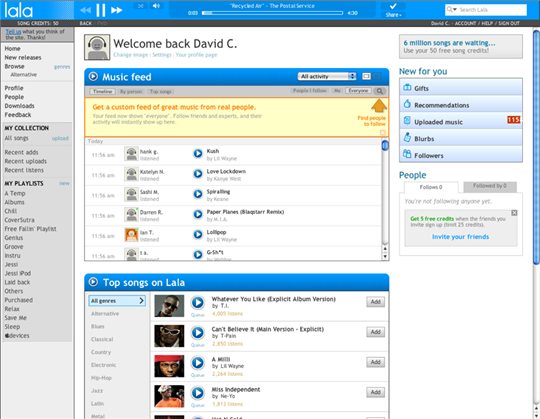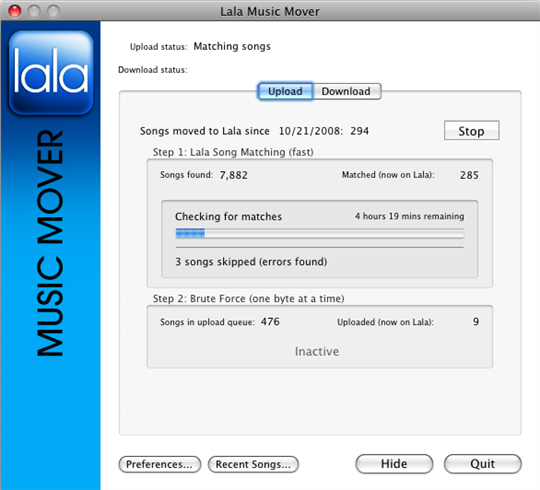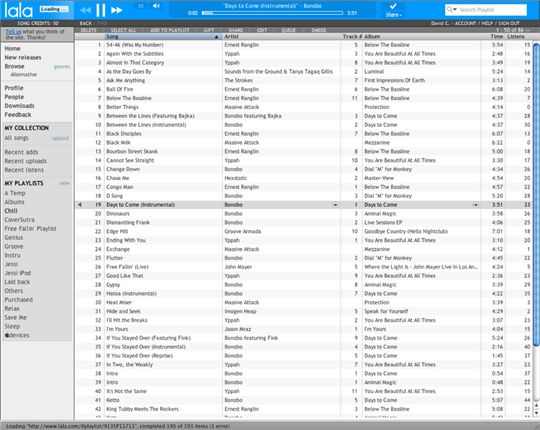What happens when a company builds a web-based music store that stays in sync with your local library and offers unlimited streaming access to all your tracks and playlists? They call it "the new Lala.com," and we call it a game changer. We spoke with John Kuch in Lala's business development and marketing department about the company's announcement and how it got the labels to sign on.
The last time we saw Lala, it had debuted the first half of this new business model: cheap, unlimited streaming access to a full, five-million-strong catalog of music that you could also pay to download as DRM-free MP3s. Songs cost 10¢ for unlimited web streaming, and that fee would count towards the full $.99 price if you chose to download later. Simple enough, and not a bad evolution for a company that started out as a CD-swapping service.
Lala's major news is that it is adding unlimited, ad-free streaming access to all the songs you already own in addition to its 10¢ streaming price on new music. The company has attempted variations of these business models in the past, announcing a small, free unlimited streaming catalog from Warner in June 2007. While users could upload their own music à la MP3.com for personal streaming, Lala pulled the plug on these features a month later due to overloaded servers and crufty licensing restrictions. The company then returned in May this year with its aforementioned 10¢ streaming and MP3 store model, but no ubiquitous library of songs one already owned.
Lala once again allows users to match their local music library with the company's online catalog. No matter where you got your music from, Lala will allow unlimited streaming access for every one of your songs that it matches to one in its library. If Lala's "Music Mover" application fails to match a song via metadata or fingerprinting, though (which is fairly unlikely, especially for DRMed iTunes DRM content), Lala's app will upload the song and allow unlimited streaming access to it at no charge, but you won't be able to share or recommend it to friends until Lala licenses the song for its main catalog.
Lala succeeded with the major labels where MP3.com failed all those years ago, and all those web-streaming utilities and hacks for iTunes now look outmoded. "This took over a year and a half to get all the licenses in place with the major labels, indie distributors, and publishers," Kuch explained. "There were a lot of conversations, and we worked to create an entirely new licensing structure in order to offer these features."
"It's a cloud app for music, really," Kuch continued, a concept that Lala's CEO, Geoff Ralston, is very familiar with. Ralston created Rocketmail, the original webmail service that Yahoo purchased back in the day, so he is no stranger to the concept of keeping one's stuff in the cloud. But instead of going with an advertising model like MySpace Music, Last.fm, or IMEEM, Lala Kuch explained that "ultimately we think people want to own music and collect music. It's counterintuitive to think that an advertising business model will provide an easy experience."
For this release, Lala sports a pumped-up catalog of over six million songs, including tracks from over 170,000 independent labels and publishers like Matador, Merge Records, Koch, Razor and Tie, Rounder Records, Ubiquity Records, Domino Records, and Beggar's Group, in addition to the major labels.
We gave Lala's new Music Mover app (Mac- and PC-compatible) a try on our 7,900+ song iTunes library, and found it to work rather well, though it's slow for now (the company is getting hammered with users matching their libraries and uploading tracks). For those of us who have had to offload libraries to external drives, Music Mover allows for custom library locations, though a file size cap of 52MB is enforced for any tracks you ultimately have to upload.
One of the most appealing features of Music Mover and its integration with Lala's iTunes-esque online player is that it uploads playlists as well, so you aren't stuck recreating them from scratch. In fact, Music Mover installs as a plug-in that maintains parity between your local and online library. Of course, the company intends for users to buy MP3s from its own store, but Music Mover will watch for music added by other means and make sure Lala mirrors your collection.
All of Lala's previous sharing and discovery features are still in full effect. Users can copy the URL of any song in Lala's catalog for sharing with friends, or share a song on Facebook. A new "Forecast" feature also allows users to pick up to four "must-listen" songs that define one's overarching musical taste, and no, we have no idea how to scrunch the breadth of our musical appetites into just four tracks.
With all of this good news, however, there are a few drawbacks to syncing one's library with the cloud. First, Lala's site accepts some metadata, such as song play counts, but not other information, like ratings. Plus, smart-playlist fans won't find any such features in Lala's player. Other disadvantages, such as a lack of EQ controls in Lala's Flash-based player, may detract from the service's appeal for some users. Knowing most people's IT budgets, though, you're probably using those cheap $5 Dell speakers at work to begin with, so what does it matter?
Lala's synchronized, unlimited cloud access for one's entire music library—bar none—is a great concept. Obviously, there are many millions of iPod users who need offline access to their music, but for others, the licensing deals that Lala nailed finally allow one's library to become truly portable. No longer are you limited at work to just the tracks that one streaming service or another offers between massive, animated advertising spots. Plus, 10¢ has become the new 99¢, especially for the millions of other users who neither own nor want an iPod.
If you can live in the cloud and can't abide ads, the new service might save you some serious cash.



reader comments